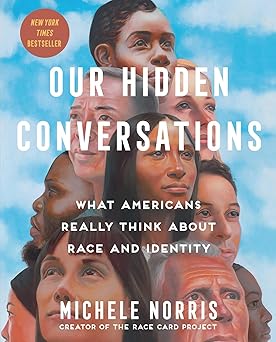
Michele Norris's groundbreaking book is a collection of stories and essays that delve into the complexities of race and identity in America. The project, which began with a simple prompt of "Race. Your Thoughts. Six Words. Please Send.", revealed a depth of humanity and candor that was both shocking and inspiring. Over half a million people shared their stories, each one a window into their unique experiences and perspectives. These stories are not just about racism, but also about identity, class, and the ways in which we interact with one another.
The stories are not limited to just six words, but can be lengthy backstories, photos, and heirlooms, providing a unique and intimate look at the American experience during a tumultuous era. What is striking about this project is the breadth of the responses, which have provided a 360-degree view of how Americans see themselves and one another. While many of the respondents were white, Norris's collection offers a rare and unexpected peek into the ways in which white Americans experience and understand racism. The stories are raw, honest, and sometimes uncomfortable, but they are also deeply human and relatable. They remind us that even in times of great division, there is still the possibility for empathy, understanding, and connection.
One of the most surprising aspects of this project is the Toll that racism takes on the human psyche. As Norris herself has said, "sometimes racist people don't know they're racist". These stories reveal the complexities of our own biases and prejudices, as well as the ways in which we both consciously and unconsciously perpetuate racism. The book is not an easy read, but it is a necessary one. It demands that we confront our own complicity in systems of oppression and to listen to the experiences of others. It reminds us that our Hidden Conversations, the ones we have with ourselves and with others, can be both a source of comfort and a source of pain.
This book is a remarkable collection of stories and essays that shed light on the complexities of race and identity in America. The author's journey began with a simple prompt that sparked a massive response from over half a million people, each sharing their unique experiences and perspectives. What I found particularly striking about this project was the depth of humanity and candor that emerged from these stories. They are not just about racism, but also about identity, class, and our interactions with one another.
As I read through the collection, I couldn't help but think about my own family and friends, and how we tend to avoid talking about topics like racism and privilege. These stories, however, encouraged me to confront my own biases and prejudices, and to think more critically about how I live my daily life. The fact that many of the respondents were white, but not silent about their experiences, was a powerful reminder that there is still much to learn and discover. The book is not an easy read, but it is a necessary one, and one that I would highly recommend to anyone looking to expand their understanding of the world around them.
One of the most compelling aspects of this project is its ability to spark difficult conversations and connections. The more I read, the more I realized that our Hidden Conversations - the ones we have with ourselves and with others - can be both a source of comfort and a source of pain. This book reminds us that we all have a role to play in dismantling systems of oppression, and that listening to the experiences of others is essential to creating a more just and equitable society. Even in the face of great division, I believe that stories like these have the power to bring us together, to humanize us, and to inspire us to do better.
Rating: 2.5 / 5.0
Michele Norris's groundbreaking book is a powerful collection of stories and essays that explore the complexities of race and identity in America. It reveals a depth of humanity and candor that is both shocking and inspiring, with over half a million people sharing their unique experiences and perspectives. The stories are raw, honest, and sometimes uncomfortable, but they are also deeply human and relatable, shedding light on the complexities of racism, identity, and class. This book is a necessary read that demands we confront our own complicity in systems of oppression and listen to the experiences of others. It has the power to spark difficult conversations and connections, and to inspire us to do better.